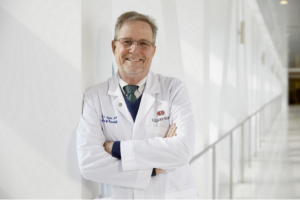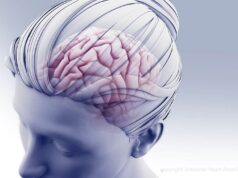
Patrick D Lyden, a world-renowned stroke expert who played a key role in the pivotal clinical trial leading to approval of the first proven stroke therapy, has received the American Stroke Association’s prestigious William M Feinberg Award for Excellence in Clinical Stroke.
The honour, which recognises significant contributions to the investigation and management of clinical research in stroke, was awarded on the 6th of February at the International Stroke Conference, Honolulu, USA.
In the late 1980s, Lyden, then at the University of California, San Diego, studied tissue plasminogen activator (tPA), in preclinical studies, and he was one of the top patient enrollers for the trial that led the US Food and Drug Administration (FDA) to approve the “clot-busting” drug in 1996. When administered soon after stroke onset, tPA sometimes can clear a blocked artery, restore blood flow to the brain and reverse the stroke’s effects. More than 20 years later, studies continue to show tPA’s long-lasting, life-saving benefits.
Lyden also was instrumental in refining the National Institutes of Health Stroke Scale (NIHSS), a measure for quantifying stroke severity, and he shared a prestigious CINE award with the National Institute of Neurological Disorders and Stroke for producing and directing NIHSS training and certification videos. Translated into 20 languages, the programmes have been viewed by two million doctors, nurses and emergency medical technicians around the world.
Midori A Yenari, a vascular neurologist and professor of Neurology at the University of California, San Francisco, USA, nominated Lyden for the award, saying she first met him when she was a beginning stroke fellow, and he profoundly influenced her career.
“He introduced me to his postdoctoral fellow, then excused himself to urgently assess an acute stroke patient on the other side of town for consideration of enrolment in the tPA trial. To my early investigator self, he was a model of the perfect physician-scientist—someone who could skilfully balance translational bench research with real-time patient care,” she said. “TPA became an international standard treatment for acute ischaemic stroke, very much in part because of Lyden’s dedication and passion for the field, and he continues to study clinical strategies for neuroprotection.”
In 2009, Lyden joined Cedars-Sinai to become the medical center’s first chair of the Department of Neurology, elevating the Stroke Program to a national leadership level. Three years later, Cedars-Sinai became one of the first five medical centres in the nation and the first in Los Angeles to be certified as a Comprehensive Stroke Center by The Joint Commission and the American Heart Association/American Stroke Association. More than 1,000 acute stroke patients are seen at Cedars-Sinai each year, and the Stroke Program consistently earns highest performance awards from the AHA/ASA.
“Lyden came to Cedars-Sinai with a sterling and well-deserved international reputation for his contributions to stroke treatment and his passion to save lives. Those of us who have had the opportunity to collaborate with him know that his scientific curiosity and his patient-centred focus—the qualities that make him so deserving of this award—have never waned,” said Keith L Black, chair of the Cedars-Sinai Department of Neurosurgery and director of the Maxine Dunitz Neurosurgical Institute.
In addition to his work on tPA, Lyden led the world’s largest study of therapeutic cooling to reduce brain injury after stroke, and he and colleagues have published breakthrough findings on the mysterious role of a protein called thrombin that stroke-injured brain neurons appear to use to signal for help from nearby cells.
“Lyden is a remarkably accomplished and renowned international leader in cerebrovascular research. A deep thinker, path-breaker, leading educator, and an impactful clinical trial leader, he has shaped our field and continues to vitally advance stroke care,” said Jeffrey L Saver, professor of Neurology at UCLA, senior associate vice chair for Clinical Research in the Department of Neurology, and director of the UCLA Comprehensive Stroke and Vascular Neurology Program.
Before joining Cedars-Sinai, Lyden, an associate editor of the International Journal of Stroke, served the Department of Neurosciences at the University of California, San Diego, as professor and vice chairman for Clinical Neurology, and he served the UCSD Medical Center as clinical chief of Neurology and director of the Stroke Center.
He earned his bachelor’s degree from UCLA and his medical degree from Baylor College of Medicine before completing an internship at Mercy Hospital and Medical Center in San Diego. He completed a neurology residency and stroke fellowship at the UCSD Medical Center.













